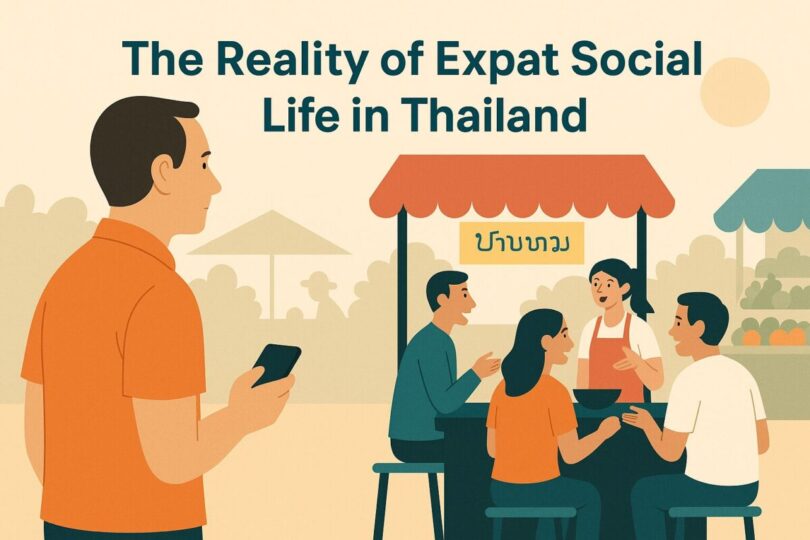How Can Expats Meet People and Build Real Friendships?

There is a strange moment that hits a lot of foreigners in Thailand. You have the apartment, a regular coffee spot, a favourite noodle stall. People back home think you are living the dream. Yet on a Tuesday afternoon you look around and realise you do not actually know who you would call if something good or bad happened.
Life is comfortable, the scenery is lovely, but, when you relocate, socially you are starting from zero.
That feeling is more common than most expats admit in public.
Surveys in other contexts show that people with weak social ties are more likely to struggle with depression and anxiety, and that strong friendships are closely linked to better physical health and longer life expectancy.
In Thailand those truths do not disappear. Regardless of whether you live in Pattaya or Phuket, Rayong or Roi-et.
What changes is that every natural route to meeting people from your old life has gone. There is no office, no long term neighbour, no school gate, no family network. Unless you make a deliberate effort to build new connections, isolation can creep in quietly under the palm trees.
The good news is that Thailand is one of the easier places in the world to put a social life back together, if you approach it on purpose. There are established expat communities, active hobby groups, and plenty of Thais who are genuinely curious about foreign neighbours. The challenge is knowing where to look, how to join in without feeling awkward, and how to avoid the social traps that leave some long term residents stuck on the fringes.
This article looks at how social life in Thailand actually works, from expat bubbles and hobby groups to friendships with Thais and online communities. The aim is simple: to help you move from being a spectator in someone else’s holiday destination to feeling that you genuinely belong here.
Understanding the Expat Landscape in Thailand
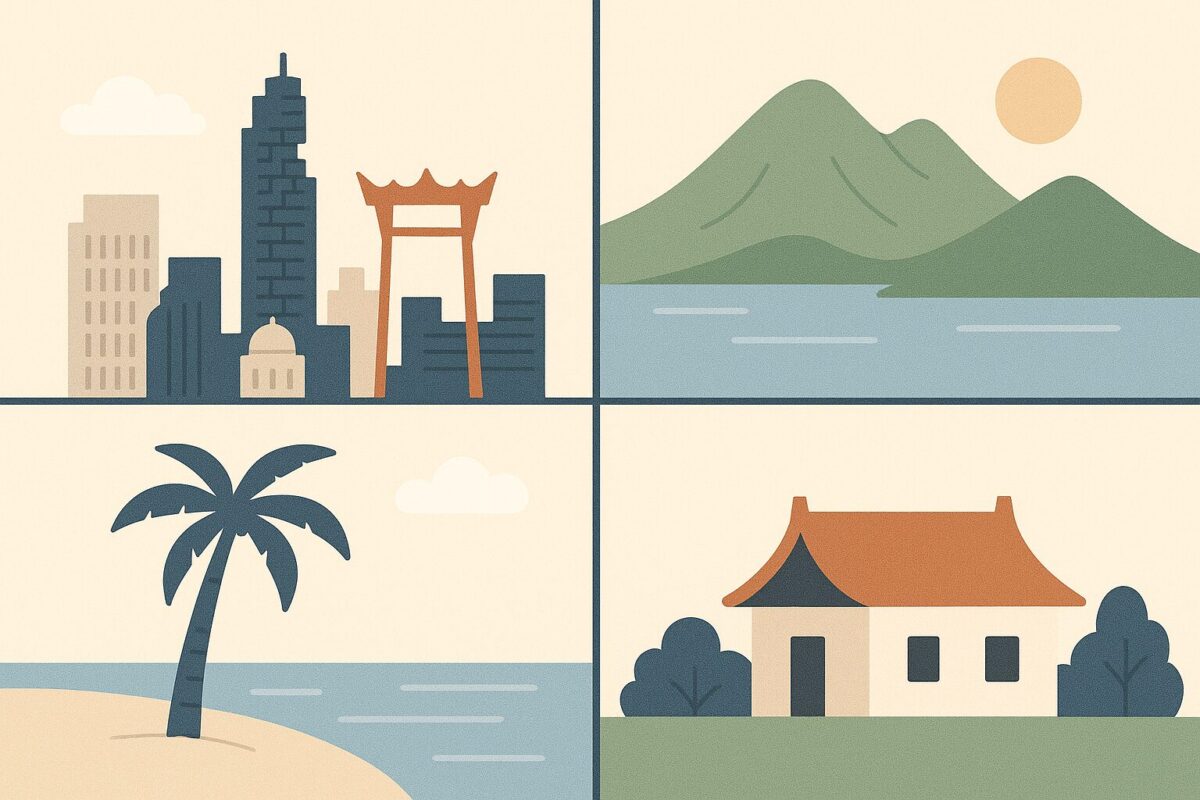
Making friends in Thailand is easier when you understand who is actually living here and how different groups build their own networks. Thailand is not one uniform expat scene. It is a patchwork of communities that vary by region, age, lifestyle and purpose. Knowing where you fit helps you find the places and people who match what you want from your social life.
Where Expats Tend to Live and Why It Matters
Certain parts of Thailand attract very specific types of foreigners.
Bangkok has the biggest mix. It draws corporate workers, teachers, long term professionals, restaurateurs, creative freelancers, and a steady flow of digital nomads. The variety means you can usually find someone who shares your interests, although the city’s size means you sometimes need to make an effort to stay in regular contact.
Chiang Mai feels very different. The pace is slower, the climate is cooler and the lifestyle suits people who enjoy cafes, crafts, meditation or outdoor activities. Digital nomads often start there, but there is also a long established population of retirees who have been around since the early 2000s. The city is small enough that you begin recognising familiar faces within a few weeks.
Phuket, Pattaya and Koh Samui have their own distinct expat cultures. These places have a steady flow of tourists but also sizeable foreign communities who have settled for years. Social life often revolves around sport, the beach, groups for retirees and evenings at familiar bars.
In Phuket you will find more outdoor fitness groups and a large sailing community. Pattaya has a strong network of golf societies and long running charity organisations. Hua Hin is especially popular with retirees who prefer a quieter lifestyle but still want reliable healthcare and a stable social scene.
There are also growing expat populations in Isaan cities such as Udon Thani, Khon Kaen and Korat. These communities tend to be centred around long term relationships, teaching jobs and local family life. The social opportunities are different from those in the tourist centres, partly because there are fewer foreigners and partly because the pace of life is more domestic.
Where you choose to live influences how easy it is to meet people. Large cities give you more variety but require more effort. Smaller towns give you instant recognition but a narrower pool of potential friends. If social life is a priority for you, choosing the right location is one of the most important decisions you will make.
Different Types of Expats You Will Meet
Thailand attracts a wide mix of foreigners, and each group forms friendships in its own way.
Retirees often search for regular routines. They join golf clubs, walking groups, breakfast meetups and long running social clubs.
English teachers build networks through their schools and tend to make younger, more international circles.
Digital nomads cluster in cafes and co-working spaces, although their friendships can be short lived because many move every few months.
There are also business owners, corporate professionals, musicians, chefs, long term volunteers, and the quiet group of “lifers” who settled in Thailand long before social media existed. These long term residents often have deep local connections, speak Thai and know how to navigate the cultural details that confuse new arrivals. They can be a valuable source of guidance if you approach them respectfully.
Understanding the mix helps you avoid comparing your social life to someone whose lifestyle has nothing in common with your own. A retired 65 year old in Hua Hin will not have the same social needs as a 28 year old coder in Chiang Mai. Both can thrive. They just do it differently.
The Expat Bubble and How It Shapes Your Social Life
Every expat area develops its own “bubble”. This is the network of bars, restaurants, coffee shops and activities where foreigners naturally gather.
The bubble is not always a problem. For many newcomers it is a lifesaver. You can have an English conversation, get practical advice, and meet others who understand the adjustment process.
The bubble only becomes an issue when it replaces the wider world completely. Some long term expats never learn any Thai, never leave their neighbourhood and rely entirely on other foreigners for company. This can create a narrow social circle, and it often leads to echo chambers where the same complaints and frustrations get recycled without solutions.
It is helpful to step into the expat bubble when you arrive, since it gives you a base. The trick is not to stay there forever. The strongest social lives in Thailand usually come from people who balance expat friends and Thai friends, foreign activities and local ones, comfort zones and curiosity.
Understanding the landscape gives you a good starting point. From here, the real work begins: figuring out how friendships are formed when you are no longer supported by the automatic social structure you had back home.
Why Making Friends in Thailand Feels Harder Than Expected
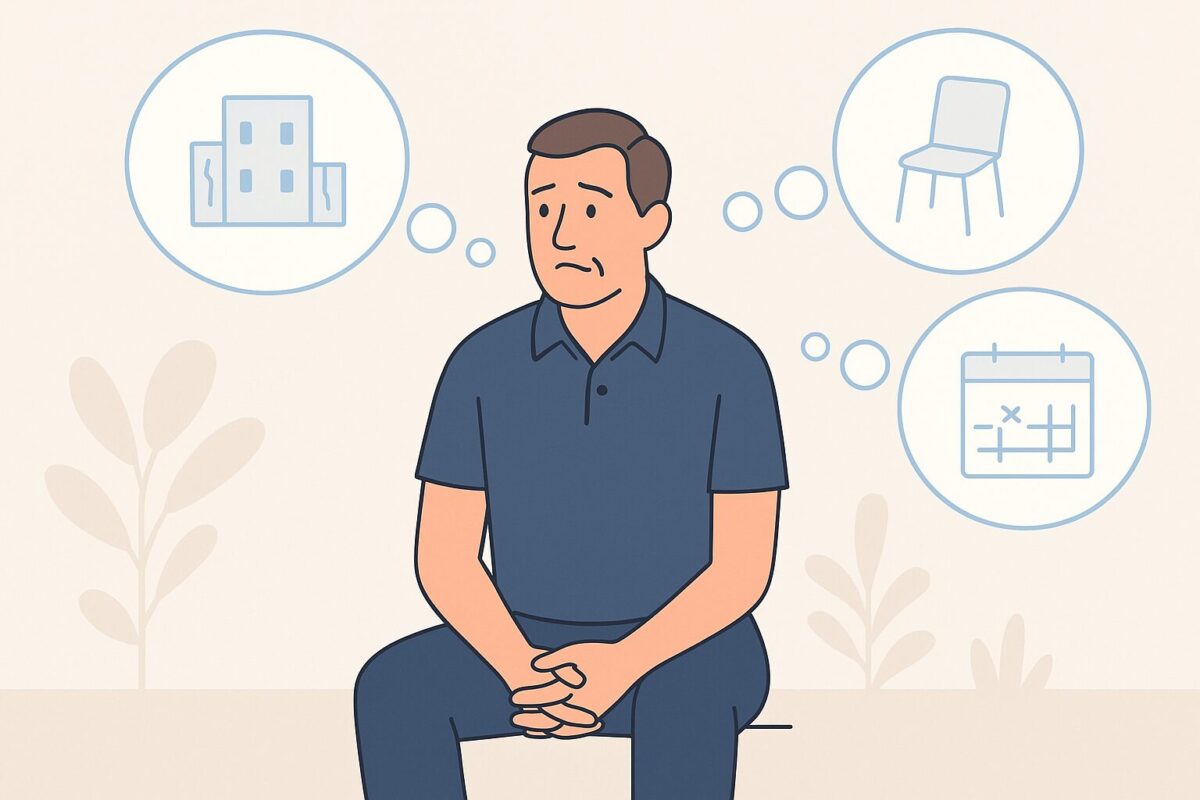
Most people arrive in Thailand thinking that meeting others will be effortless. After all, the country feels friendly, relaxed and open. You are surrounded by people every day, from neighbours watering plants to smiling staff in shops and restaurants. Yet after the first month or two, many expats discover that building real friendships is not quite as simple as chatting to strangers or joining a few Facebook groups. And that can effect mental health.
The barriers are subtle, and they often catch newcomers off guard.
Leaving Behind a Lifetime of Built-In Connections
In your home country, you rarely think about how friendships form because so many social pathways are automatic.
Work colleagues turn into after-hours friends.
Parents meet other parents at school events.
Neighbours stop to talk outside their houses.
Long term friends are people you met through family, university or childhood.
None of these pathways exist when you step off the plane in Thailand. Those everyday touchpoints vanish, and you suddenly need to rebuild a complete network entirely on your own.
That shift feels liberating at first. No office politics, no obligations, no routine commitments. But the absence of structure also removes the natural opportunities that make friendships grow without effort. Without actively seeking new connections, it is possible to spend days or even weeks in Thailand without a meaningful conversation.
A Country Full of Short-Term People
Another challenge is the transient nature of many communities. Thailand sees a constant flow of digital nomads staying for three months, retirees trying the country for a year, English teachers on one-year contracts, bar staff who move between towns, and backpackers who drift through for a season. Even in established expat cities, the population turns over far more quickly than in most Western towns.
This has an effect on the way people approach friendships.
Some expats keep their distance because they are used to seeing people leave again. Others invest heavily in friendships only to find the other person moves on shortly afterwards. This cycle can make long term residents cautious, and newcomers often have to prove they are sticking around before they are fully welcomed into deeper social circles.
Cultural Differences in How People Connect
Thailand’s social rules are different from those in the West, and this influences how relationships form.
Thais tend to communicate in a softer, more indirect style. They avoid open conflict, they prefer harmony, and they are careful not to make others feel embarrassed. This can feel polite and pleasant, but it also means it takes time to know where you stand.
A Thai acquaintance may smile warmly and invite you to something out of politeness rather than genuine intent. A Westerner may mistake this as the start of a close friendship and push too fast.
Foreigners can also misread Thai friendliness.
Service staff are often extremely polite and welcoming, but that does not necessarily translate into personal friendship. Many expats confuse warmth with intimacy and end up feeling rejected when the relationship does not progress in the way they imagined.
Language as a Social Gatekeeper
Even if you know some Thai, being limited to surface-level conversations is common during the first few years. Asking for food, directions or help is easy. Talking about personal stories, humour or deeper emotions is harder. Because of this, early friendships often form with other foreigners simply because conversation is effortless.
This is not a flaw in either culture. It is simply the reality of communication. Until you learn more Thai or find bilingual locals who enjoy speaking English, the depth of your connection will be limited.
The Social Disruption You Do Not See Coming
The biggest reason making friends feels harder in Thailand is that the move disrupts every part of how you define yourself.
You are no longer the person in your old job, your old neighbourhood, your old social groups. Without these anchors, many expats feel a quiet sense of displacement. That emotional fog can make you less outgoing, less confident and less likely to take the social risks needed to meet new people.
Recognising these factors helps you avoid blaming yourself.
The difficulty is not personal. It is structural.
You are rebuilding a life in a place where nothing is automatic. Once you understand that, it becomes much easier to take the right steps toward a social life that actually works.
Practical Strategies for Building a Social Circle From Scratch
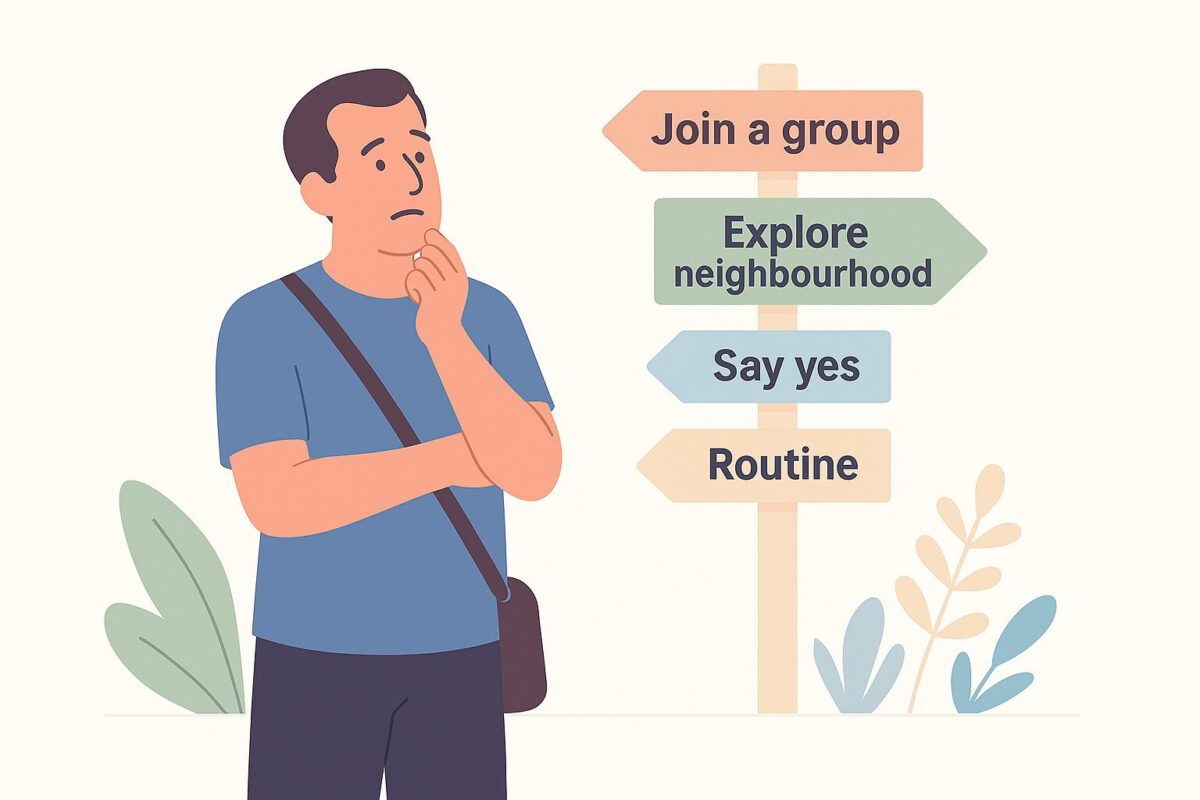
If you want a social life in Thailand that feels stable and genuinely enjoyable, you need to approach it deliberately.
The people who thrive here long term are not the ones who wait for friendships to appear on their doorstep. They are the ones who take small, consistent steps to meet others and who understand that building a community in a foreign country takes intention. The goal is not to force connections, but to create the conditions where relationships can grow naturally.
Say Yes More Often Than You Say No
One of the simplest but most effective strategies is to say yes to invitations during your first few months. Even the ones that feel slightly outside your comfort zone.
A stranger inviting you to a walking group, a neighbour asking you to join them at a weekend market, or an acquaintance suggesting a casual drink may all feel like small invitations, but these moments are often the start of friendships.
There is a useful rule many expats follow: treat the first 90 days as your “social foundation” period.
If you accept most invitations during that window, you build momentum. People notice that you show up. They begin to include you in more activities. The early effort pays off later in the form of stronger, more natural connections.
Choose a Neighbourhood That Matches Your Social Style
Where you live influences who you meet. Some areas naturally encourage casual socialising, while others leave you more isolated.
In cities like Chiang Mai or Bangkok, streets with independent cafes, small bars, shared workspaces and walkable surroundings tend to produce more spontaneous interactions. A quiet condo on the outskirts of town is peaceful, but you may spend days without seeing a familiar face.
If you are retired, areas with long established expat groups make a noticeable difference. Hua Hin’s breakfast clubs, Pattaya’s golf societies and Phuket’s various sports groups give newcomers immediate entry points into established social scenes. If you are working remotely, choosing a neighbourhood with a good coworking space helps you meet others with similar routines.
The right area is not only convenient. It supports your social goals and reduces the effort required to meet people.
Let Routine Work in Your Favour
Humans bond through repetition.
If you go to the same café at the same time each morning, people start recognising you. You become a familiar face rather than a passing foreigner. The same happens with gyms, walking routes, weekly markets and community classes. Routine creates pleasant, low-pressure opportunities for casual conversation, which often grow into genuine friendships.
Creating a simple weekly rhythm is one of the most overlooked strategies for building a social life. Choose a place where you feel comfortable, and return frequently. Over time, familiarity builds trust, and trust creates connection.
Learn to be Approachable
Approachability is a skill, and Thailand rewards it.
A friendly expression, a willingness to make small talk and an open posture go a long way. Many expats unintentionally project tension or guardedness while adjusting to a new culture. Locals notice this, and even other foreigners may hesitate to approach someone who looks uncomfortable or withdrawn.
You do not have to fake happiness. You simply need to let people know you are open to conversation. Thailand’s social culture values friendliness, and a little effort in this area produces a surprisingly large return.
Understand That Social Life is a Two Way Street
Some newcomers fall into the habit of expecting others to bring them into the group. They wait to be invited, wait to be included and wait for someone else to make the first move. In reality, the people who integrate fastest are the ones who take small initiatives themselves.
Invite someone for coffee after a meetup.
Suggest a weekly walk.
Offer to join a group activity even if you do not know anyone well yet.
Taking even a small step signals interest, and most expats respond positively when they see you are making an effort. You do not have to be extroverted. You only need to be willing to participate.
These practical strategies lay the groundwork. In the next section we move from general principles to specific places and activities where meaningful friendships actually form across Thailand.
Joining Clubs, Groups and Activities: Where Real Friendships Form
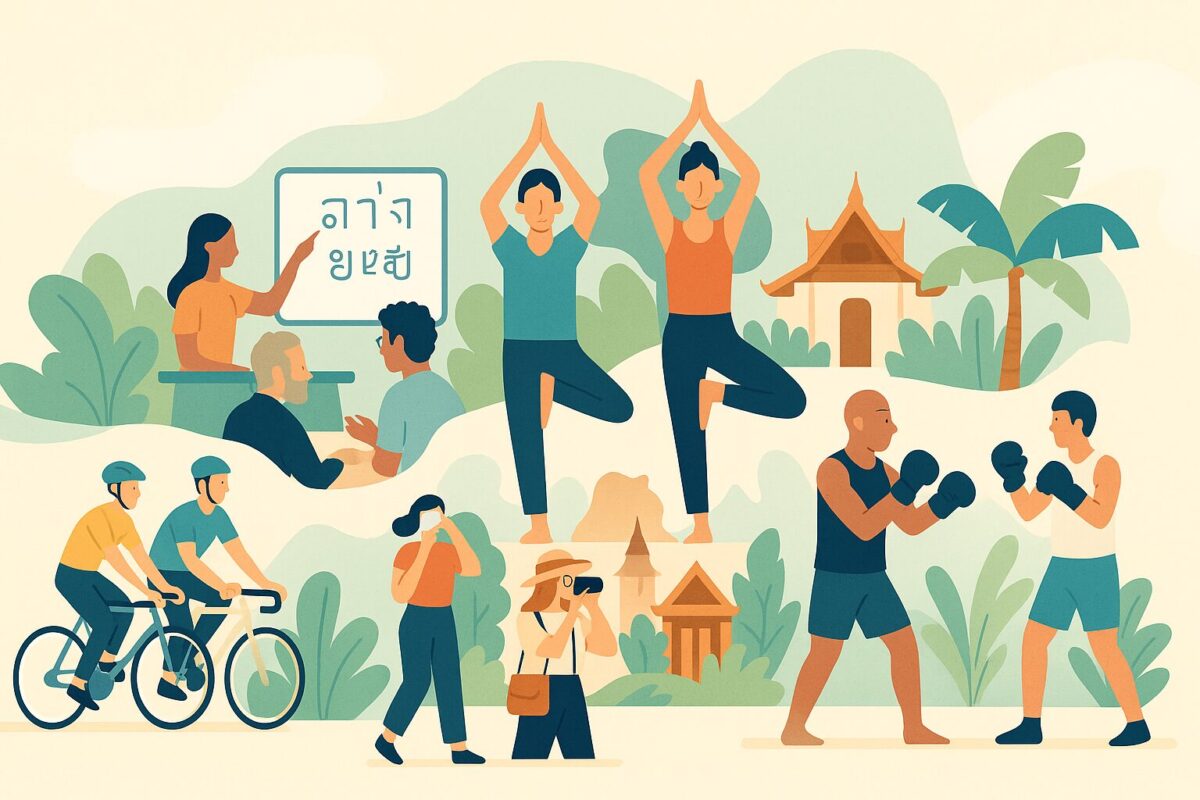
Most expats discover that friendships do not form from vague intentions like “getting out more” or from going to bars and hoping to meet the right people.
Real social connections come from shared activities, recurring groups and spaces where people come together for a purpose. Thailand has no shortage of these. The key is knowing where to look and joining environments that encourage natural conversation rather than forced interactions.
These clubs and activities are not about filling time. They are about creating a social ecosystem where friendships can grow naturally.
Sports and Fitness Groups
Thailand is one of the easiest countries in Asia for staying active, and sports communities often serve as the backbone of expat social life. Fitness groups give structure, friendship and a sense of belonging without feeling like a formal commitment.
Muay Thai gyms often attract a mix of locals and foreigners. While serious fighters train intensively, many gyms offer beginner and fitness classes where the atmosphere is friendly and inclusive. Shared effort creates bonding quickly, and the combination of Thai and foreign participants offers a balanced social environment.
Cycling groups are common in Bangkok, Chiang Mai and Phuket. Bangkok has the popular Green Mile bike track near Suvarnabhumi Airport, while Chiang Mai riders often form groups for mountain routes around Doi Suthep. Phuket has both road cycling and triathlon communities. Group rides typically end with coffee, which becomes an easy setting for conversation.
Golf societies have long served as a social hub for retirees. Hua Hin alone has more than a dozen active golf groups, and Pattaya and Phuket have well established communities as well. Golf provides a predictable weekly structure, and many retirees find their closest friendships on the course.
If you prefer something gentler, there are walking groups, trail running clubs, yoga studios, Pilates sessions, open water swimming meetups and mixed martial arts fitness classes.
The shared activity is often just the starting point. Friendships develop during warm ups, cool downs and post workout meals.
Creative and Hobby Based Communities
If sports are not your thing, Thailand has a surprisingly rich creative scene. Photography clubs in Chiang Mai and Bangkok organise outings to temples, markets and rural areas. These gatherings attract a mix of hobbyists and professionals and are ideal for people who enjoy exploring quietly while still being part of a group.
Many towns offer cooking classes, both Thai and international. These classes often lead to informal supper clubs or casual weekend cookouts. Art workshops, pottery studios and creative coworking spaces also attract people interested in craft and design.
Language classes are a particularly valuable social tool. Unlike other hobbies, language learning attracts people who are actively trying to integrate. When you sit in a class with the same small group for weeks, friendships emerge naturally. You also gain confidence interacting with locals, which expands your social possibilities beyond the classroom.
Volunteering and Community Service
Volunteering is one of the most effective ways to meet thoughtful, grounded people. Beach clean ups, animal rescue centres, charity organisations and community projects always need extra hands. These activities attract expats and Thais who are motivated by a desire to contribute rather than just pass time.
Bangkok and Chiang Mai have several well established volunteer networks. Pattaya and Hua Hin have long running charity golf events and fundraising groups. Phuket has animal rescue organisations that rely heavily on foreign volunteers. Even on smaller islands, you will find community gardens, children’s English programmes and environmental projects.
Volunteering accelerates connection because you are doing something meaningful alongside others. It also helps counter the drift and lack of purpose that many long term expats struggle with.
Faith Based and Meditative Communities
Even if you are not religious, faith based communities can be a surprisingly good source of social stability. Churches in Bangkok, Chiang Mai and Pattaya have sizeable expat congregations and organise social events, charity work and support groups.
Meditation centres often attract people who want a calmer lifestyle. Several temples run free or low cost meditation sessions in English, and many retreats welcome expats. These groups tend to create gentle, low pressure friendships built on shared values.
Skill Learning and Professional Interest Groups
Coworking spaces are a strong social anchor for remote workers. Places like The Hive in Bangkok or Punspace in Chiang Mai host workshops, coffee mornings and networking evenings. These spaces attract people who want both productivity and community.
Tech meetups, software development groups, coding clubs and freelance networks offer another dimension of connection. These are excellent for younger expats or anyone with a professional skill set. You meet people who share your interests, and the friendships often feel more grounded than those built in nightlife environments.
Groups like Toastmasters Thailand draw a mix of locals and expats interested in communication skills and personal development. These meetings have a structured format that encourages participation while making it easy to talk to others afterwards.
Meeting Thai People and Building Local Friendships
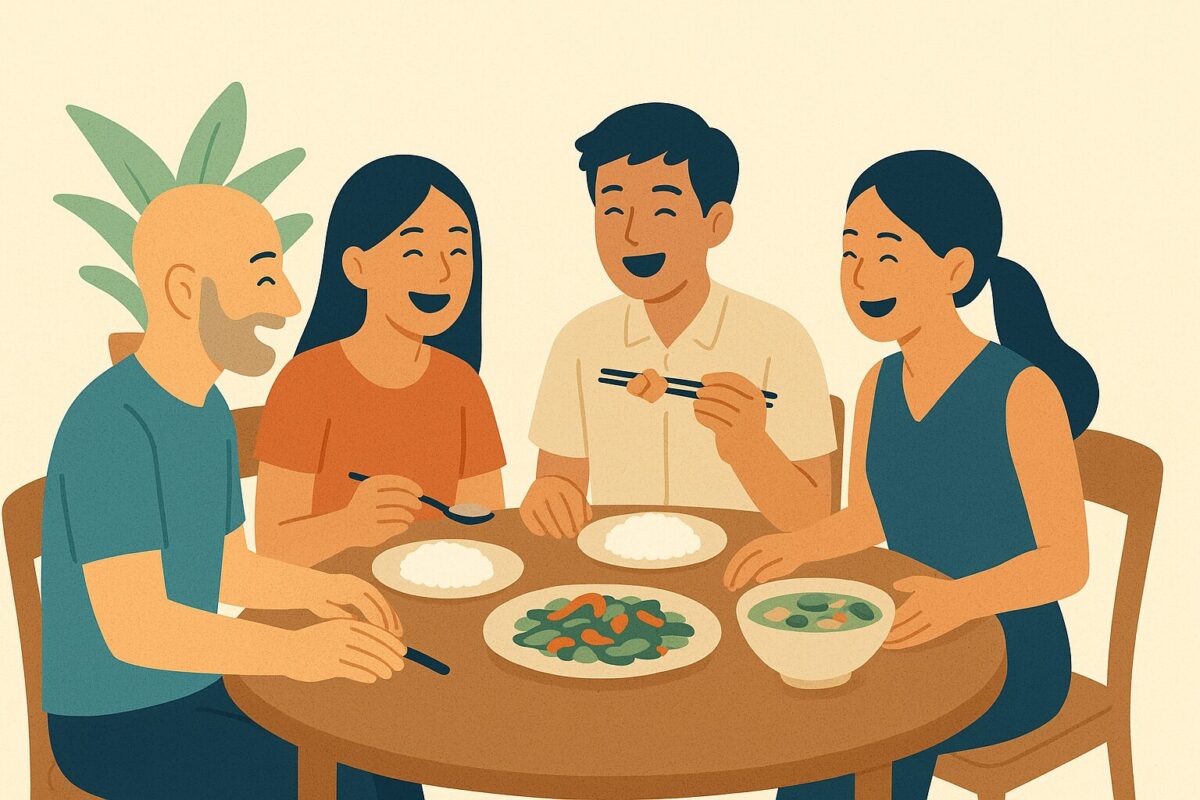
A balanced social life in Thailand usually includes both expat and Thai friends. Foreigners often find it easy to meet other expats because they share language, background and similar life transitions. Building friendships with Thais can take more time, but it adds depth, stability and a sense of belonging that many long term residents say is the real dividing line between “living in Thailand” and simply “being here.”
Building friendships with Thais takes patience, but the rewards are significant. People who integrate locally feel more rooted, more stable and more satisfied with their life in Thailand.
Understanding What Thai Friendship Looks Like
Thai people tend to approach new relationships gently. They give warmth easily but trust more slowly. There is a difference between casual friendliness and deeper friendship, and this difference can confuse newcomers. A Thai shopkeeper, coworker or neighbour may smile warmly and chat with you every day without intending a close relationship. On the other hand, once someone considers you part of their circle, loyalty, generosity and practical help often appear in ways that surprise foreigners.
Food is a central part of Thai social life. Many friendships begin with simple gestures like sharing snacks or inviting someone to join a meal. These invitations carry meaning because meals are typically communal. Accepting food, contributing something small in return and showing genuine appreciation go a long way in building rapport.
Thais also value consistency. Turning up regularly, keeping promises and showing respect are the foundations of trust. If you appear and disappear unpredictably, or if you treat interactions casually, relationships tend to stay at the surface level.
Social Norms That Foreigners Often Misread
One of the most common misunderstandings involves the Thai preference for indirect communication. Many Thais avoid direct negative statements because they do not want to cause embarrassment or conflict. This can lead to polite invitations that are intended as kindness rather than literal commitments. A newcomer might take “join sometime” as an enthusiastic invitation, when the speaker meant it as a polite gesture.
Silence can also be misinterpreted. Western cultures often fill gaps in conversation quickly, especially in new interactions. Thai conversations tend to flow with slower rhythms. A pause is not a sign of discomfort but a moment of reflection or courtesy.
Foreigners sometimes mistake Thai politeness for romantic interest, especially when interacting with young staff in bars, cafes or hotels. Service workers are trained to be highly courteous, which can be unfamiliar to newcomers and easy to misread. In Thai culture, hospitality is professional, not personal.
Another subtlety is that Thai humour is often playful and teasing. People may joke about small things as a form of affection. Learning to join in without taking jokes too seriously helps build rapport.
How to Make Thai Friends Without Feeling Awkward
Friendships with Thais often begin around shared activities. Community sports like badminton, running clubs, table tennis, or even weekend group hikes are great levellers. Yoga classes, cooking schools, or arts workshops are also common mixed spaces where Thais and foreigners blend naturally.
Language can be a barrier, but you do not need fluency. Even a small effort with Thai phrases shows respect and signals that you value the connection. Thais often appreciate foreigners who try to learn, no matter how imperfectly. Starting with basic greetings, numbers and polite phrases builds confidence quickly.
You can also join mixed groups where English-speaking Thais participate. For example, Toastmasters meetings, photography clubs, environmental groups and charity organisations often include both locals and expats working together toward a shared purpose.
Showing up matters as much as what you say. When locals see you participating regularly, helping out when needed and treating others with kindness, trust builds naturally. Over time you will be invited to events, meals or family gatherings that show you have become part of their circle.
Pitfalls to Avoid When Interacting with Thais
Pushing too hard or too fast is a common error. Western cultures often prize directness and quick intimacy. Thai friendships grow at a slower pace. Trying to move the relationship forward quickly can make people step back.
Another mistake is overly direct criticism. Thais avoid confrontation and consider blunt comments impolite. If you complain loudly or point out faults in public, people will withdraw. It is better to raise concerns privately and with softer language.
Money is another sensitive area. Some foreigners assume that generosity means paying for everything, which can create unhealthy dynamics. Others become suspicious and avoid local friendships entirely because they fear being taken advantage of. The reality is simpler. Most Thais appreciate shared costs and fair treatment. Clear, respectful boundaries prevent misunderstandings.
Finally, avoid making comparisons between Thailand and your home country, especially if the comparisons are negative. Even if someone agrees with your criticisms privately, hearing them from a foreigner can cause discomfort.
Friendship for Retirees and Younger Expats

Not every expat in Thailand arrives with the same expectations or needs. A retired couple settling in Hua Hin is not looking for the same social rhythm as a twenty-something freelancer in Nimmanhaemin, and a long term English teacher in Khon Kaen will have a completely different community from a sailing enthusiast in Phuket.
Friendships in Thailand form differently depending on who you are, what stage of life you are in and how long you intend to stay. But regardless of age, one strategy works for everyone: combining offline socialising with carefully chosen online communities.
Understanding how age, lifestyle and routine influence social circles prevents unfair comparisons and helps you build relationships that genuinely match your stage of life.
How Retirees Build Social Connections
Retirees often face the paradox of having plenty of time but fewer natural avenues for meeting others. Work used to provide structure, purpose and daily conversation. Once that disappears, many retirees discover that their social life relied more on their professional environment than they realised.
In Thailand, retirees tend to form routines that become the backbone of their friendships. Morning coffee meetups, weekly golf societies, walking groups, breakfast clubs and long running expat gatherings make it easy to recognise familiar faces. Many retirees like predictability, so social scenes in places such as Hua Hin, Pattaya and Phuket become stable communities where people know each other for years.
However, retirees also face challenges that younger expats do not. Health issues, limited mobility and reliance on specific areas for healthcare can restrict social options. Some older expats unintentionally slip into routines that revolve almost entirely around bars, which may feel sociable at first but can limit connection and lead to unhealthy patterns over time. For retirees, the strongest friendships usually come from activities that include movement, routine and shared interests beyond nightlife.
Volunteering is particularly powerful for older expats. Helping at animal shelters, supporting charity organisations or joining community projects not only creates social connections but also restores the sense of purpose that many retirees miss after leaving full time work.
The Social Routines of Younger Expats and Digital Nomads
Younger expats and digital nomads often find it easier to meet people but harder to maintain long term friendships. They gather naturally in coworking spaces, cafés, gyms, creative workshops and shared apartments. Events for freelancers, coding meetups, photography walks, skill sharing sessions and weekend trips create a fast moving social scene that can be lively and energising.
The challenge is turnover. Many younger expats stay only three to six months before moving on. Others are in Thailand temporarily while they wait for their next contract or project abroad. This creates a constant churn where friendships appear quickly but often disappear just as fast. People are friendly and open, but long term stability can be elusive.
Some younger expats fall into the party circuit, which brings instant companionship but shallow connections. Those who stay longer usually shift toward more grounded routines. They join sports groups, running clubs, climbing gyms, language classes or creative communities where the pace is slower and the friendships last longer.
Mixed Thai and foreign groups are especially beneficial for younger residents. Many Thai professionals enjoy meeting foreigners in spaces where interests align. Whether it is a dance class, a hiking club or a creative meetup, these mixed environments often develop into some of the most meaningful friendships young expats make.
The Benefits and Challenges of Mixed-Age Friendships
Thailand naturally blends age groups in a way that many Western countries do not. It is not unusual to see a retired Scandinavian golfer having lunch with a thirty year old British teacher or a younger Thai professional. Shared location and shared interest often matter more than age.
Mixed-age friendships work best when expectations are clear. Younger expats often appreciate the experience and stability older residents bring. Retirees often enjoy the energy and curiosity of younger friends. The exchange can be mutually beneficial, as long as the differences in lifestyle and pace are respected.
Where mixed-age groups sometimes struggle is in matching rhythms. Retirees may prefer early mornings and predictable plans. Younger expats may be more spontaneous and social in the evenings. Being aware of these differences helps prevent misunderstandings.
Online Communities and Social Media: Useful Tools With Important Limits

Online spaces play a major role in how expats connect across Thailand. They can help you discover events, ask questions, find local recommendations and meet people with similar interests. Used wisely, they accelerate your social life rather than replace it. Used poorly, they can trap you in echo chambers, amplify negativity or keep you behind a screen when you should be out meeting people in real life. Understanding the strengths and limits of online communities is essential for building a healthy social life in Thailand.
Facebook Groups: The Expat Noticeboard
Almost every town with a foreign population has a dedicated Facebook community. In larger places, such as Bangkok, Chiang Mai, Pattaya, Phuket and Hua Hin, there are dozens. Some are general discussion groups. Others focus on buy-and-sell listings, sport, visas, local events or community support.
These groups are useful for:
- finding activities, workshops and social meetups
- discovering restaurant openings, charity events and market fairs
- getting practical advice from long term residents
- hearing about new hobby groups or volunteer needs
They are less useful when:
- threads devolve into arguments
- people post dramatic or confrontational content
- misinformation spreads quickly, especially around visa topics
- the loudest voices shape the tone, even if they are not representative
The best approach is simple. Use Facebook groups as a tool, not a home. Let them help you find your way into real life situations, but avoid living socially through a newsfeed.
LINE: The Social App That Really Matters in Thailand
Many expats never realise how important LINE is in Thai social life. It is the primary messaging app used by Thais, comparable to WhatsApp in many countries. Workplaces use it, families use it and most community groups use it as well. If you want to integrate with local social circles, LINE is almost unavoidable.
Joining LINE groups can help you:
- stay informed about local events that never appear on Facebook
- be included in Thai-organised activities
- chat with neighbours, gym groups or language classmates
- become part of mixed Thai–expat communities
LINE tends to be warmer and more personal than Facebook. People share reminders, photos, jokes and updates. Once you join a group, you start to feel part of a real community rather than an online forum.
Meetup, Internations and Eventbrite: Structured Social Platforms
Bangkok, Chiang Mai and Phuket have active scenes on Meetup and Internations. These platforms are especially helpful for newcomers who feel unsure about where to start. Many events attract a mix of Thais and foreigners and often include:
- language exchanges
- business networking
- hiking groups
- photography walks
- fitness meetups
- meditation and wellness workshops
The advantage of these platforms is structure. You know what the event is, who is hosting it and what to expect. The downside is that some events attract transient participants who attend once and disappear. Friendships often require follow-up contact to deepen.
Forums, Reddit and Niche Groups
Long before Facebook dominated everything, expats in Thailand used web forums. Some still do. Sites such as ASEAN NOW (previously ThaiVisa) continue to host active discussions, although they tend to skew toward older expats and practical topics.
Reddit communities like r/Thailand and r/expats can be useful for broader perspectives. Some people also join topic-specific forums or Discord groups for hobbies such as gaming, photography, cycling or tech.
These spaces are best for information, not connection. They help you understand trends, ask questions and learn from others’ experiences, but they rarely create real friendships unless you follow up offline.
How to Use Online Communities Without Getting Stuck in Them
Online expat spaces can either help you build a satisfying social life or keep you quietly isolated. The difference lies in how you use them.
Healthy use looks like:
- using online posts to find events and then showing up
- messaging people privately to arrange meetups
- joining mixed groups that include Thais and expats
- using online advice as a starting point, not a final answer
Unhealthy use looks like:
- arguing in comment threads
- relying on online approval for a sense of belonging
- getting caught in negative, bitter or confrontational communities
- replacing real interactions with scrolling and complaining
Many long term expats will tell you the same thing. Thailand becomes more rewarding the moment your main social life shifts from online to offline. Digital communities are tools, not substitutes. They are most powerful when they lead you to real people, real conversations and real routines.
The Social Danger Zones: Where Expats Go Wrong
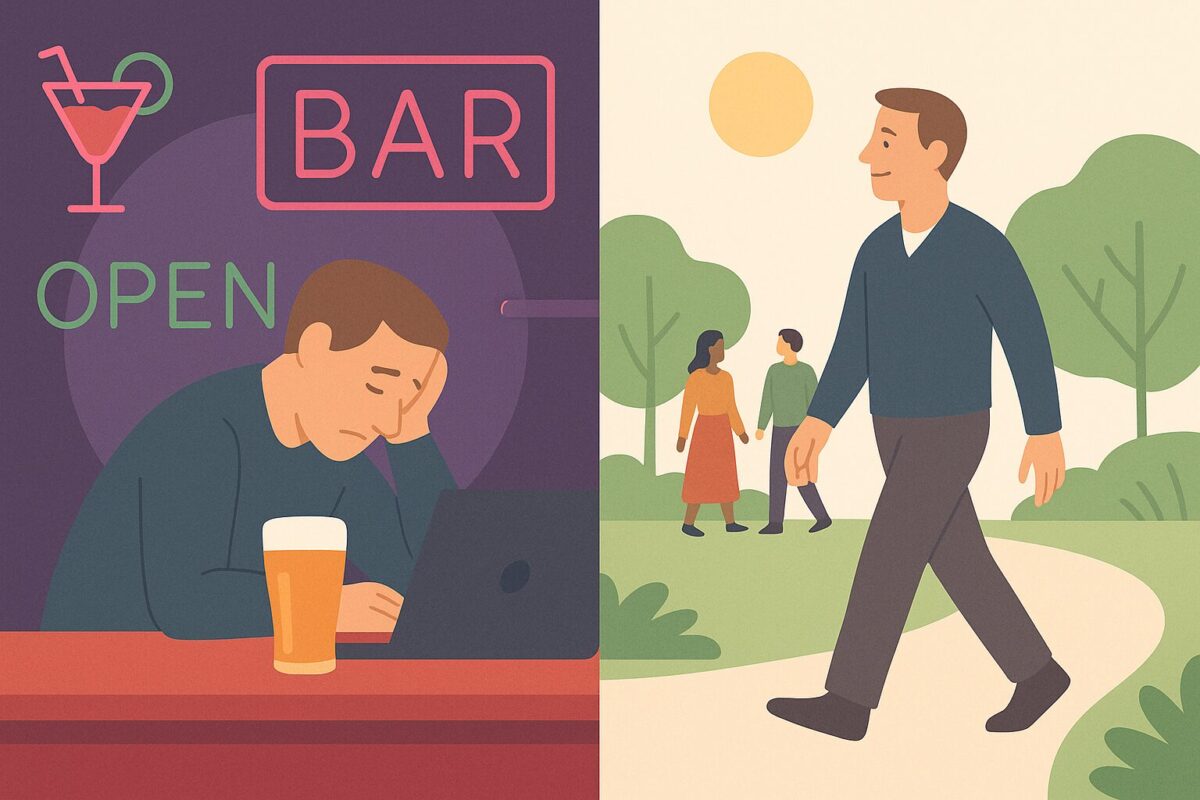
Most people arrive in Thailand with good intentions and an open mind, but even well meaning expats can fall into patterns that work against building a healthy social life. These pitfalls are common enough to be considered part of the landscape. The goal is not to judge anyone who ends up in them, but to understand how they develop and how to avoid getting stuck. A strong social life usually depends as much on what you avoid as what you pursue.
Avoiding these danger zones makes your social life more stable, but thriving long term requires something more: a sense of purpose and a structure that gives your weeks shape.
Relying Too Heavily on Bars
Bars are the easiest social entry point for many new arrivals. They offer instant company, predictable routines and a familiar environment for Westerners who feel overwhelmed by cultural differences. In places like Pattaya, Phuket or certain neighbourhoods of Bangkok, the bar scene can feel like the entire expat community compressed into a few streets.
There is nothing inherently wrong with bars. Many long term friendships begin over a beer. The problem comes when nightlife becomes the only social outlet. Bar friendships often revolve around familiar topics, repeated stories and patterns of drinking that grow heavier over time. Conversations are friendly but sometimes shallow, and when alcohol is the glue holding things together, the relationships may not translate well outside that setting.
Expats who rely too much on bars often find that their social life looks busy on the surface but lacks depth. They know many faces but have few truly supportive friendships. If the bar scene is the foundation of your community, adding broader activities can make your social life healthier and more stable.
Falling Into Negative Expat Circles
Every expat community has a small but vocal subset of people who feel stuck, frustrated or disappointed with their life abroad. These individuals often gather in predictable places: the most combative Facebook groups, the complaint heavy corners of online forums, certain bar clusters or long established meetups known for cynical humour.
Spending too much time in these circles has a predictable effect. Even if you arrive with enthusiasm, constant exposure to negativity, criticism or bitterness can colour your own view of Thailand. Social psychologists call this “emotional contagion,” where moods spread unconsciously through groups. People who surround themselves with negative voices often begin to echo the same complaints, even if their own experiences were originally positive.
It does not mean you must avoid everyone who vents about Thailand. Complaints are normal. But choosing your core group carefully makes a big difference. Balanced expats, hobby groups, fitness circles and mixed Thai–foreigner communities tend to create healthier, more resilient mindsets.
Letting a Romantic Relationship Replace an Entire Social Life
Thailand is a country where it is easy to meet romantic partners, especially for men. Many expats enter relationships quickly, which can be wonderful, but there is a common trap that follows. Some people rely so heavily on their partner for connection that they stop building wider friendships.
This creates pressure for both people. When one person becomes the other’s only emotional outlet, small disagreements can feel bigger, and unexpected challenges become harder to handle. If the relationship struggles, the expat often finds themselves without a support network.
Couples who build friendships independently and together tend to have more stable relationships. Integrating into mixed social circles reduces pressure and helps both partners feel balanced.
Withdrawing Without Realising It
Isolation does not happen in one day. It creeps in slowly. You skip a meetup because you are tired. You stop going to the gym for a few weeks. You convince yourself you will reach out to friends “tomorrow.” Before long, days blend into each other and you realise you have not spoken to anyone in depth for quite a while.
Thailand’s environment makes this surprisingly easy. If you live alone in a condo, no neighbours knock on your door. If you are retired, there are no colleagues asking about your weekend. If you work remotely, you can go days without leaving the house. What feels peaceful at first can turn into quiet loneliness.
Recognising early signs of withdrawal helps you counteract the pattern. A simple rule many long term expats follow is this: schedule at least three social touchpoints each week. They do not have to be big events. A coffee with a neighbour, a gym class, a volunteer shift or a hobby meetup all count. The goal is momentum.
Building a Purpose Driven Life: The Foundation of Long Term Happiness
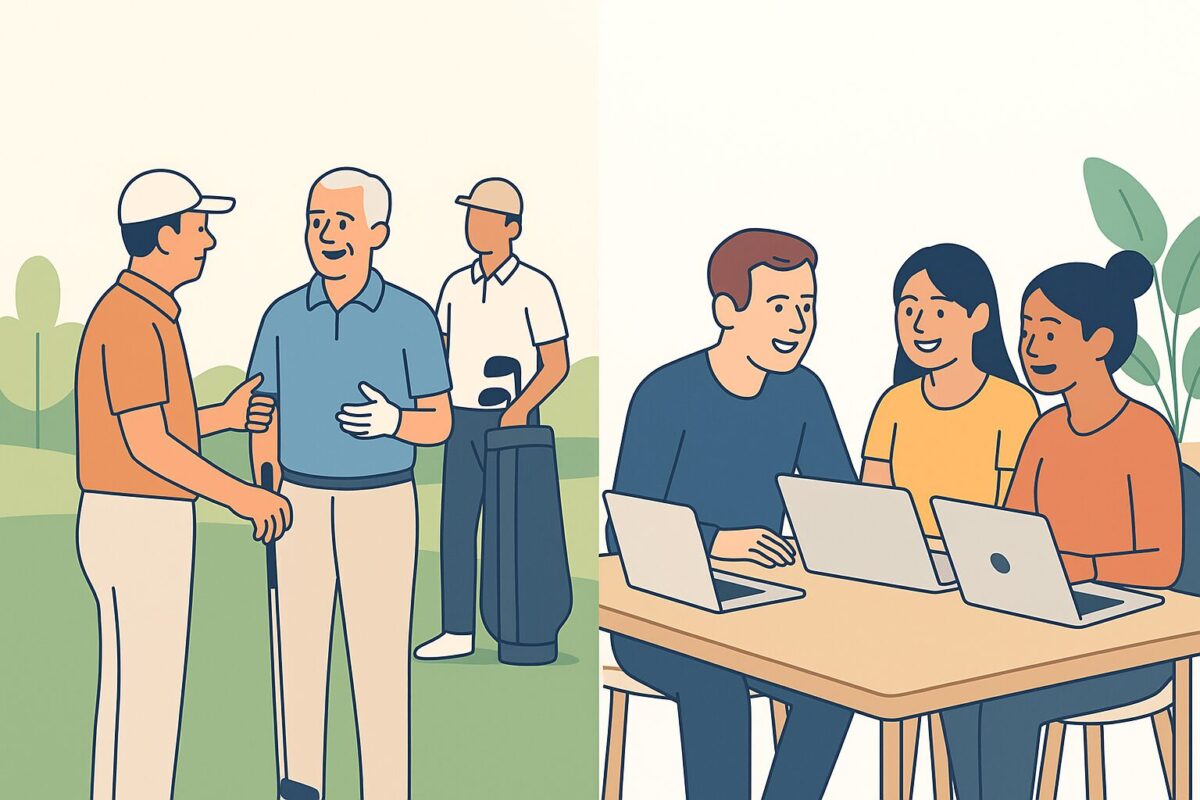
A strong social life does not appear out of thin air. It grows from the routines, responsibilities and small commitments that give your days meaning. Many expats assume that friendships will simply form once they have settled in, but the truth is that purpose is the soil friendships grow in. Without structure or direction, even the most beautiful place begins to feel empty. Purpose stabilises you, and stability makes it easier to connect with others genuinely rather than from a place of drift or loneliness.
Purpose driven routines turn Thailand from a pleasant place to live into a place where life feels full.
Why Purpose Matters More Than People Realise
In your home country, purpose was woven into your life whether you noticed it or not. Work schedules, family duties, volunteer responsibilities, hobbies, social calendars and long term projects all kept your days organised. When you move to Thailand, those anchors disappear. The freedom feels wonderful at first, but many expats discover that limitless free time becomes unsettling if nothing new fills its place.
Research on ageing and wellbeing shows that people who maintain purpose, routine and community involvement live longer, stay healthier and report higher levels of life satisfaction. Purpose creates emotional resilience. It gives you a reason to get up in the morning, a reason to leave the house, and a sense that you are contributing to something bigger than yourself. Without it, days can start to blend together, and social life becomes passive rather than active.
Routines That Anchor Your Social Life
The most successful long term expats are not always the most outgoing or adventurous. They are often the ones who build steady weekly routines that create natural opportunities for interaction. These routines do not need to be complicated. What matters is consistency.
Common examples include:
- morning walks on the same route where you see familiar faces
- attending the same coffee shop around the same time each day
- regular gym sessions or fitness classes
- weekly golf, cycling or yoga meetups
- language classes that meet at set intervals
- volunteer commitments such as animal shelters or community projects
When you turn something into a weekly ritual, the social element grows on its own. You recognise people, they recognise you, and conversations start to deepen. You no longer feel like a visitor drifting through Thailand. You feel like a resident with roots in the local community.
Community Involvement as a Source of Purpose
Volunteering is one of the strongest sources of purpose for expats. Whether it is supporting animal rescue organisations, helping with beach cleanups, running charity events, assisting local schools or joining environmental projects, giving your time provides direction and connection at the same time.
These environments attract people who are engaged, patient and grounded. Friendships that emerge from volunteer work often feel more meaningful than those formed in nightlife settings or casual meetups. They are based on shared effort rather than convenience.
Purpose does not always come from formal volunteering. Many expats find meaning in mentoring younger people, helping newcomers adjust, or taking on small community roles. Organising a weekly walking group, helping someone learn English, or planning an occasional outing can all create a sense of contribution.
Expanding Your Identity Beyond “The Foreigner”
One of the hidden benefits of building purpose is that it transforms how you see yourself. Many long term expats say that the hardest part of living abroad is feeling like their identity shrank when they left their home country. They went from being valued professionals, involved parents, respected community members or skilled hobbyists to simply being “the foreigner” in a new environment.
Purpose restores that lost dimension. When you are part of a club, a project or a community, you are no longer defined by where you came from. You are defined by what you contribute.
A structured and purposeful life also helps avoid the sense of drifting that leads many expats into the less healthy social patterns described earlier. Purposeful people tend to attract others, and they often become the stable centre of small but meaningful social circles.
Becoming the Connector
Some expats naturally evolve into connectors: the people who organise dinners, arrange hiking trips, schedule movie nights or create group chats. These roles do not require extroversion. They simply require initiative. When you take the lead occasionally, even in small ways, people begin to associate you with positive experiences.
Being a connector also ensures you do not rely on others for your social life. You build it yourself. You shape it according to your interests. And you attract people who resonate with the activities you organise.
Over time, becoming the connector gives you a deeper sense of belonging. You are no longer on the outside looking in. You are one of the people who make things happen.
When Your Social Life Isn’t Working: Rebooting Without Leaving Thailand
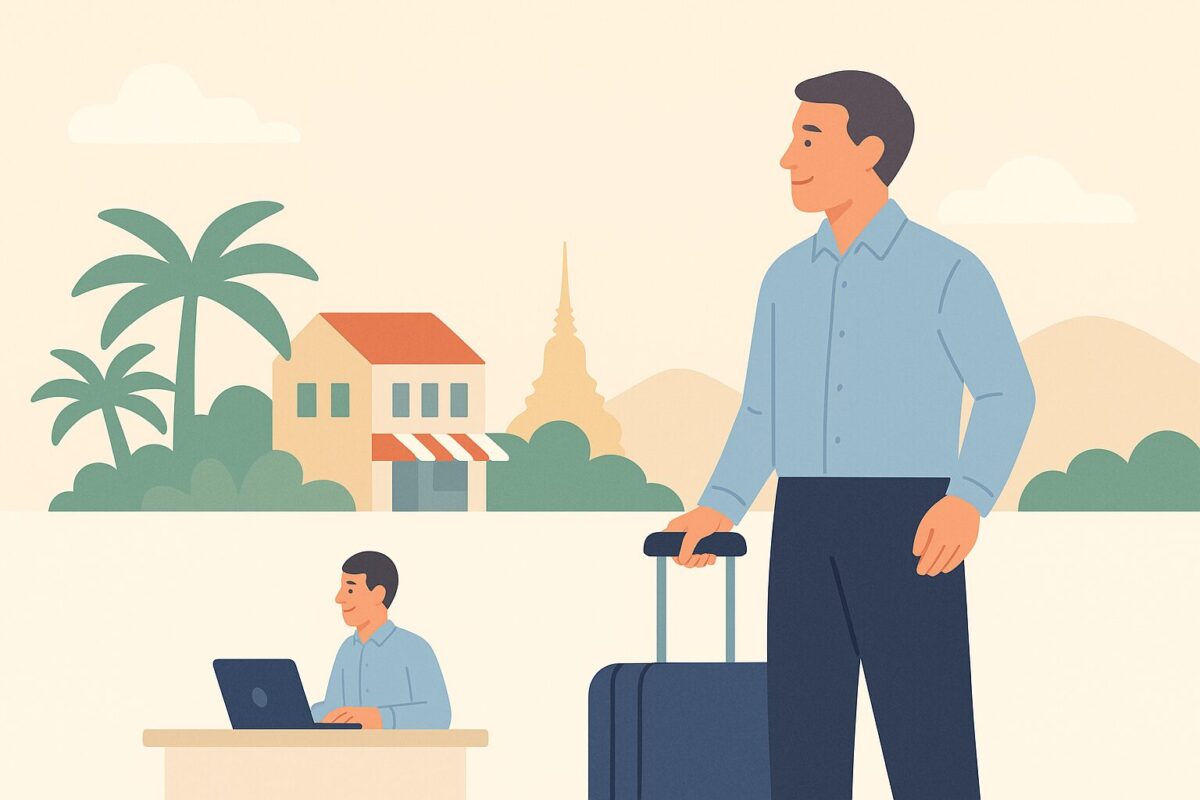
Even with good intentions, the right routines and an open attitude, there are times when your social life in Thailand simply does not feel satisfying. Maybe the friends you have made are casual rather than close. Maybe your routines no longer excite you. Maybe you live in a community that is friendly enough, but not quite your crowd. Or maybe you still feel like an outsider despite months or years of effort.
These feelings are common, and they are not a sign that life in Thailand is failing. Instead, they are signals that something in your environment or habits needs adjusting. Many long term expats go through at least one major social reboot during their time here. The key is learning how to do it in a healthy, intentional way.
Changing Where You Live Can Change Everything
Thailand is diverse enough that moving to a new neighbourhood or city can completely transform your experience. A person who feels isolated in central Bangkok may find a close knit community in Chiang Mai’s old town. Someone who feels lost in Phuket’s resort areas may find meaningful friendships in a quieter district like Rawai. Retirees who feel stuck in Pattaya might discover that Hua Hin suits them better, or vice versa.
These moves do not require abandoning your life. They are adjustments within the same country. For many expats, shifting locations introduces them to entirely new social circles, interests and routines. A short trip to scout new areas can reveal places that match your lifestyle more closely. You may find walking groups, arts communities, temples, fitness scenes or creative clusters that align with your personality far better than your current surroundings.
A change of place is one of the most underestimated tools expats have for rebooting their social life. Thailand gives you plenty of room to try again without starting over completely.
Restart Strategies That Work Almost Everywhere
If moving cities feels too drastic, you can reboot your social life right where you are by making deliberate shifts in your habits.
Several strategies work consistently across Thailand:
- Join one new weekly activity. Something structured. A fitness class, a language course, a volunteer shift, a photography walk. Weekly repetition builds bonds.
- Pick a new social anchor location. A new café you visit daily, a coworking space, a community park or a gym. A new environment leads to new faces.
- Reconnect with people you met early but never followed up with. Many expats have half formed connections that faded simply due to lack of initiative.
- Shift your schedule. Morning routines attract different types of people than evening routines. Nightlife crowds differ from daytime hobbyists.
- Attend local events. Festivals, markets, workshops, cooking classes. They expose you to mixed Thai and expat groups.
- Invite people instead of waiting to be invited. A small coffee meetup, a beach walk, a movie night or a casual dinner at home.
These changes are simple, but they interrupt stale patterns and open the door to new opportunities.
Recognising When Your Social Environment No Longer Fits
Sometimes people feel uneasy without knowing why. If you experience the following, you may be outgrowing your current social circle:
- you feel drained after spending time with your usual group
- conversations revolve around complaints or routines you no longer relate to
- you sense you are playing a role rather than being yourself
- you have interests your current community does not share
- you feel more relief than excitement when you skip meetups
These feelings do not mean your friends are bad people. They simply mean you are ready for a different environment. People evolve. Thailand’s expat landscape is large enough to accommodate that evolution.
When to Rethink the Lifestyle Altogether
Reevaluating your social life inside Thailand is healthy. But occasionally, deeper questions surface. If you have:
- tried multiple routines
- lived in several regions
- joined groups, volunteered, learned Thai
- and still feel disconnected or unfulfilled
then it may be time to reflect on what you really need from your expatriate experience.
Some people discover they miss family more than they expected. Others realise that the lifestyle they imagined does not match their personality. Some expats return home part time and live a dual location life that provides a healthier balance. Others relocate to a different country that suits them better.
Reevaluation is not failure. It is clarity. Most expats who reassess their situation end up improving it, not abandoning Thailand. The point is to design a life that works for you rather than forcing yourself to fit into a version of Thailand that leaves you frustrated or isolated.
Expat Life in Thailand Gives Back What You Put In

A fulfilling social life in Thailand does not arrive ready made. It grows from the choices you make, the routines you build and the people you welcome into your days.
Moving abroad resets almost everything about your social world, and that reset can feel both liberating and unsettling. The first weeks and months are often a blur of new faces, new surroundings and new expectations. After that initial excitement fades, what remains is the deeper work of building a life that feels connected rather than lonely, active rather than stagnant and meaningful rather than accidental.
The expats who thrive long term are not the ones with the most dramatic adventures or the biggest online followings. They are the ones who keep showing up. They join the walking groups, the language classes, the volunteer projects and the regular coffee meetups. They take small risks. They accept invitations even when they feel shy. They introduce themselves. They follow up. They invite others out. They create habits that place them in the company of people who share their interests and values.
Friendships here form differently from those in your home country. They grow slowly, through routines and familiar faces, shared meals and small acts of trust. Thai friendships take time, but once you are welcomed into a circle, the warmth, loyalty and generosity often run deeper than newcomers expect. Expat friendships shift as people come and go, but they can become some of the closest relationships you ever make, forged through shared experience, cultural challenges and the ups and downs of life far from home.
Living in Thailand means balancing comfort with curiosity. The comfort of familiar expat spaces gives you a base. The curiosity to step outside them gives you a community. When you mix the two, Thailand becomes more than a place to live. It becomes a place where you belong.
If your social life feels quiet now, remember that every strong expat network started with someone who arrived knowing no one. With steady effort, your circle will grow. With intention, your days will find shape. With time, the unfamiliar becomes familiar, and the country that once felt overwhelming begins to feel like home.
Thailand has space for you. It always has. The key is meeting the country halfway and allowing the friendships, routines and everyday moments to take root. Once they do, the social life you build here can be richer, more varied and more rewarding than anything you imagined before you arrived.
Useful Resources
Finding groups, meetups and activities
- Meetup – events in Bangkok – Social, language, fitness and interest based groups in the capital.
- Meetup – Thailand groups – Events and meetups in other cities around Thailand.
- Eventbrite Bangkok – Talks, workshops and social events you can book online.
- Punspace Chiang Mai – Popular coworking space network and social hub for remote workers.
Volunteering and community projects
- Soi Dog Foundation – Animal welfare charity in Phuket with regular volunteer opportunities.
- Lanta Animal Welfare – Animal rescue and volunteer projects on Koh Lanta.
- Trash Hero Thailand – Beach and community cleanups in locations around the country.
- Thai Red Cross Society – National organisation involved in health and community support.
Learning Thai and understanding local culture
- AUA Language Center – Long established Thai language classes in several cities.
- Duke Language School Bangkok – Thai classes aimed at expats, with flexible schedules.
- Learn Thai with ExpatDen – Curated list of Thai learning resources, apps and study tips.
- ThaiPod101 – Audio and video lessons for learning Thai at your own pace.
- Chiang Mai Community (Facebook) – General discussion, questions and local tips for Chiang Mai.
- Bangkok Expats (Facebook) – Large group for people living long term in Bangkok.
- Phuket Expats (Facebook) – Local information and social questions for people based in Phuket.
- Hua Hin Expat Community (Facebook) – Community group for long term residents on the Hua Hin coast.


